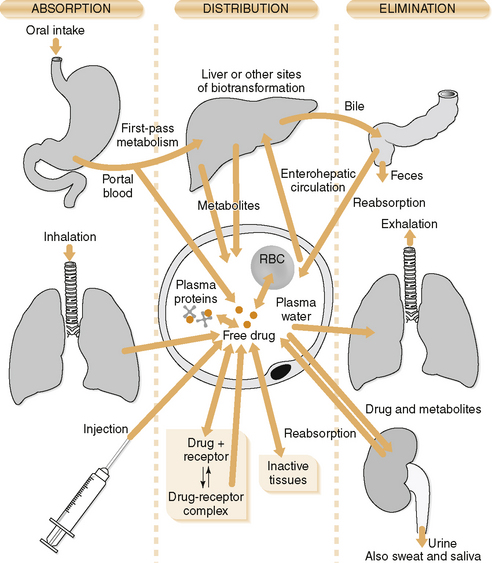Which phase of pharmacokinetics is affected by the first pass effect?
Excretion
Metabolism
Distribution
Absorption
The Correct Answer is D
Choice A: Excretion
Excretion is the process by which drugs and their metabolites are eliminated from the body, primarily through the kidneys (urine), but also via bile, sweat, saliva, and other routes. While excretion is a crucial phase of pharmacokinetics, it is not directly impacted by the first pass effect. The first pass effect primarily involves the metabolism of a drug before it reaches systemic circulation, which occurs prior to the excretion phase.
Choice B: Metabolism
The first pass effect, also known as first-pass metabolism or presystemic metabolism, significantly impacts the metabolism phase of pharmacokinetics. This phenomenon occurs when a drug is metabolized at a specific location in the body, such as the liver or gut wall, before it reaches systemic circulation. As a result, the concentration of the active drug is reduced, affecting its bioavailability. The liver is the primary site for this metabolic process, where enzymes break down the drug, potentially leading to a significant reduction in its therapeutic effect.
Choice C: Distribution
Distribution refers to the process by which a drug is transported from the bloodstream to various tissues and organs in the body. This phase is influenced by factors such as blood flow, tissue permeability, and binding to plasma proteins. However, the first pass effect does not directly alter the distribution phase. Instead, it affects the amount of drug that enters systemic circulation, which in turn can influence the extent of distribution.
Choice D: Absorption
Absorption is the process by which a drug enters the bloodstream from its site of administration. This phase is crucial for determining the onset of a drug’s action. While the first pass effect occurs after absorption, it does not directly change the absorption phase itself. Instead, it affects the drug’s concentration after it has been absorbed and before it reaches systemic circulation.

Nursing Test Bank
Naxlex Comprehensive Predictor Exams
Related Questions
Correct Answer is C
Explanation
Choice A: Alkalosis
Alkalosis refers to a condition where the blood pH is higher than the normal range (above 7.45). In this case, the pH is 7.25, which indicates an acidic environment rather than an alkaline one. Therefore, alkalosis is not the correct answer.
Choice B: Respiratory
Respiratory acidosis or alkalosis is determined by the levels of PaCO2. In respiratory acidosis, PaCO2 is elevated, while in respiratory alkalosis, PaCO2 is decreased. Here, the PaCO2 is 20 mm Hg, which is below the normal range, indicating a respiratory component. However, the primary issue is not respiratory because the HCO3- is also significantly low, pointing towards a metabolic cause.
Choice C: Metabolic
Metabolic acidosis is characterized by a low pH and a low HCO3- level. In this case, the pH is 7.25, and the HCO3- is 10 mEq/L, both of which are below the normal ranges. This indicates that the primary acid-base imbalance is metabolic acidosis.
Choice D: Acidosis
Acidosis refers to a condition where the blood pH is lower than the normal range (below 7.35). The given pH of 7.25 confirms that the patient is experiencing acidosis. However, this choice alone does not specify whether it is metabolic or respiratory acidosis.
Choice E: With Compensation (Being Compensated)
Compensation refers to the body’s attempt to return the pH to normal by adjusting the levels of PaCO2 or HCO3-. In this case, the low PaCO2 suggests that there is a respiratory compensation for the metabolic acidosis. However, the primary imbalance remains metabolic acidosis.
Correct Answer is ["A","B","C","E"]
Explanation
Choice A Reason:
Chronic stress can significantly impact mental health, leading to conditions such as depression. The persistent activation of the stress response system, particularly the release of cortisol, can alter brain function and structure, contributing to mood disorders. Studies have shown that prolonged exposure to stress hormones can lead to changes in the brain that are associated with depression.
Choice B Reason:
Impaired cognitive function is another consequence of chronic stress. Elevated levels of cortisol over an extended period can damage the hippocampus, a region of the brain involved in memory and learning. This can result in difficulties with concentration, memory, and decision-making. Chronic stress has been linked to cognitive decline and an increased risk of neurodegenerative diseases.
Choice C Reason:
Chronic stress can also affect the immune system, leading to autoimmune diseases. The continuous activation of the stress response can cause immune dysregulation, where the body’s immune system mistakenly attacks its own tissues. This can result in conditions such as rheumatoid arthritis, lupus, and other autoimmune disorders.
Choice D Reason:
Overactive immune function is not typically associated with chronic stress. Instead, chronic stress often leads to a weakened immune response, making the body more susceptible to infections and illnesses. Therefore, this choice is incorrect.
Choice E Reason:
Cardiovascular disease is a well-documented consequence of chronic stress. The persistent release of stress hormones like adrenaline and cortisol can lead to increased blood pressure, heart rate, and the formation of artery-clogging deposits. These changes can increase the risk of heart disease, heart attacks, and strokes.
Whether you are a student looking to ace your exams or a practicing nurse seeking to enhance your expertise , our nursing education contents will empower you with the confidence and competence to make a difference in the lives of patients and become a respected leader in the healthcare field.
Visit Naxlex, invest in your future and unlock endless possibilities with our unparalleled nursing education contents today
Report Wrong Answer on the Current Question
Do you disagree with the answer? If yes, what is your expected answer? Explain.
Kindly be descriptive with the issue you are facing.
